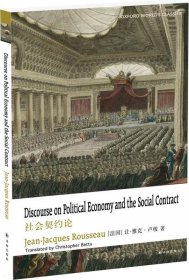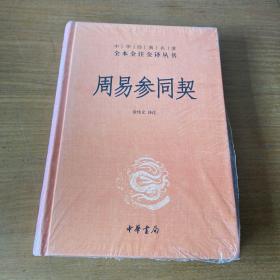
全新正版现货 社会契约论 9787544759922
正版新书现货 可以下单一般就是有货的 下午5点前订单当天发货
¥ 9.89 4.3折 ¥ 23 全新
库存21件
作者让-雅克·卢梭
出版社译林出版社
ISBN9787544759922
出版时间2016-03
版次1
装帧平装
开本16开
纸张胶版纸
页数244页
字数99999千字
定价23元
货号R_8679113
上书时间2024-02-20
- 在售商品 暂无
- 平均发货时间 7小时
- 好评率 暂无
- 最新上架
商品详情
- 品相描述:全新
- 商品描述
-
基本信息
书名:社会契约论
定价:23.00元
作者:让-雅克·卢梭
出版社:译林出版社
出版日期:2016-03-01
ISBN:9787544759922
字数:150000
页码:244
版次:1
装帧:平装
开本:16开
商品重量:
编辑推荐
牛津大学出版百年旗舰产品,英文版本原汁原味呈现,资深编辑专为阅读进阶定制,文学评论名家妙趣横生解读。
内容提要
发表于1762年的《社会契约论》是卢梭重要的政治著作,书中提出的“主权在民”思想具有划时代的意义,是现代民主政治的基石。其核心思想“合法的国家必须根据普遍意志来进行管理”代表了人民对旧有制度的替代,象征了主权和自由。
目录
Introduction A Note on the Text and TranslationSelect BibliographyA Chronology of Jean-Jacques RousseauPOLITICAL ECONOMYTHE SOCIAL CONTRACTAppendix: The General Society of the Human RaceExplanatory NotesIndex
作者介绍
序言
In 1755, the publication of Rousseau’s Discourse on Inequality brought him considerable success, but also created obligations. The Discourse, in tracing the moral decay of man in society, drew a large-scale contrast between the state of nature, in which man had at least the potential for good, and the social state, which as Rousseau described it had led to misery and tyranny . The contrast between nature and society made it possible to denounce many political and social evils, but left fundamental questions unanswered; the author owed it to himself and to his public to develop his ideas further. One question was how the individual’s potential for good could be preserved in the social milieu of the mid-eighteenth century, and to this answer came with ?mile, or Education (1762); another was whether coexistence in society necessarily made all the citizens hostile to each other, seeking their own interests at the expense of everyone else. The historical approach of the Discourse, together with the discreet omission of direct political reference, left it unclear whether the evils depicted by Rousseau were those only of his own time and place, or were inevitable in all societies at every period. The Social Contract, expanding some hints in an enigmatic paragraph of the Discourse, denies this inevitability and offers a more optimistic evaluation. However, the optimism is fragile; Rousseau shows that politically organized society, ‘the state’ as he usually calls it, can be beneficial and just, but also that the threats to a well-ordered state are persistent and ubiquitous. During the years that it took for his thought to mature, he contributed his article Political Economy to Diderot and d’Alembert’s Encyclopédie and discussed the social and moral aspects of culture in the long Letter to d’Alembert on theatre (1758). He also wrote one of the century’s most popular and influential novels, Julie, but abandoned an ambitious project he had started, a work on political institutions generally. He says at the beginning of the Social Contract, which appeared in 1762, the same year as ?mile, that it is all that remains of this larger work. The paragraph in the Discourse on Inequality (towards the end of Part II) had sketched the main theory in outline: ‘The people having, as regards their social relations, concentrated all their wills into one, the several articles in respect of which this will is expressed become so many fundamental laws. . . and one of articles regulates the choice and power of the magistrates [officers of state] appointed to watch over the execution of the rest’,. Rousseau introduces the passage with a guarded remark that he is here adopting the ‘common opinion’ that society is based on a contract, or blinding agreement; he thus acknowledges that he was working within a particular conceptual tradition, the contract theory of the state. This dated back to ancient times, and had been of fundamental importance in European thought since the sixteenth century. As regards Rousseau’s contribution to the tradition, two preliminary observations should be made: that for most educated Europeans the standard view, even as late as 1762, was probably not the contract theory, despite its influence, but the belief that kings had a divine right to rule, a right that was seen as the origin and basis of social organization; and secondly, that among those who preferred the contract theory, the usual view again favoured monarchy, interpreting the contract as some kind of agreement between ruler and subjects (a ‘contract of submission’) by which the subjects consent to be ruled. Rousseau made a great change. It lies in the words ‘having concentrated all their wills into one’. The notion thus expressed was later, in the article Political Economy, to become the ‘volonté générale’, or general will. It is this concept, rather than his view of the contract, which is Rousseau’s lasting contribution to political theory. Its appearance in the Contract is a clear sign that monarchist theories of the state were beginning to give way to democratic ideas, ‘the people’ having (in Rousseau’s formulation of the contract) an active rather than a passive role. In an even wider context, the concept of the general will is of importance to anyone reflecting on the relationship of the individual to the social group or groups of which he is a member, since it seeks to define the nature of the bond by which the group is created. The Political Economy article, though published like the second Discourse in 1755, seems likely (the point is debatable) to have been written after it, the Discourse dating back to an essay competition announced in 1753. Rousseau wrote the article when he and Diderot were close friends; they quarreled a few years later. Diderot commissioned the article, and he and Rousseau seem to have cooperated in working out their political ideas, since Diderot wrote, for the same volume, an article on Nature Law (Droit naturel) to which Rousseau’s article refers, and on which he must have reflected deeply. A chapter discarded from the Contract, given here in the Appendix, refutes some of its arguments. ‘La volonté générale’, however is a phrase used also by Diderot, and Rousseau’s reference to him in the Encyclopédie concerns the general will; it appears in a passage which compares society, the ‘the body politic’, to a human body. This is part of an argument that a social group, while it consists of separate individuals, possesses a single will, which like the will of a particular person ‘tends always to the conservation and well-being of the whole’. What part Diderot played in the genesis of the idea now always connected with Rousseau is unclear, but the passage in the Political Economy article testifies to an important stage in its development. In various other respects also Rousseau’s article, commonly known as his Discourse on Political Economy, is transitional between the Discourse on Inequality and the Social Contract. It retains the high moral tone and some of the indignant rhetoric of the earlier discourse, for instance in the third section when contrasting the situations of rich and poor, and displays already the later work’s anxiety about the maintenance of the social bond, constantly at risk because of the selfishness and partiality of particular elements of society, whether individuals or groups. Less methodical and abstract than the Contract, and superficially more modern in that there are fewer illustrations taken from the ancient world, it tackles one major subject barely mentioned in the Contract, that of taxation, and has much to say on patriotism, which the Contract does not discuss explicitly; the link between patriotism and the maintenance of social feeling, however, will be clear. The feel of the two works is different, too. Perhaps in adapting himself to the authoritative style expected from an encyclopaedia, Rousseau tends in article to treat society from the administrative angle, a manner that seems not to have suited him, because he did not return to it. He was prepared to play the loftier role of legislator, as in his A Projected Constitution for Corsica (written in about 1764-5) or his Considerations on the Government of Poland (1771-2), but not that of public official. In the Social Contract, the voice is that of the theorist, but one who is more on the side of the individual than of government. The essential vision is that of the member of society, the figure Rousseau usually calls the citizen, a man (it has to be accepted that, whether out of obedience to convention or deliberate choice, Rousseau’s terminology is consistently masculine) who is not isolated as he conceivably would be in the ‘state of nature’, but one among many others of the same kind forming a society. The precise date at which Rousseau began working towards his treatise is not known. In the Confessions, Book X, he explains that it was on moving house late in 1757 that he abandoned most of the larger project on political institutions in general. Of the Contract, a partial first version has survived in what is called ‘the Geneva manuscript’. It contains roughly the same material, differently arranged, as the first two books of the published work, breaking off soon after the beginning of the third; there is also a draft of the last main chapter, on civil religion. The manuscript also shows that Rousseau hesitated over his title. Apparently not fully satisfied with the word Contract, he at one time preferred ‘On civil society’. In the text, he often uses synonyms such as pact, notably in the title of the sixth chapter of Book I, a basic chapter which follows some preliminary arguments rebutting earlier theories of society. The essential idea is that of a voluntary agreement among a group. Initially, the agreement is seen as the answer to the problem of ensuring joint protection for a number of people living in unsafe conditions; later it becomes something more like a consensus on the value of living in society. Even in the formulation of the problem in I. vi, the concept of the general will is hinted at, and the definition of the pact, when it comes, in effect defines the general will also. Beginning in terms of self-interest—each future associate seeks to remain free, while receiving benefits from the cooperation of all the others—the argument leads towards the mutual surrender of individualism; after agreement
-

【封面】
相关推荐
-

全新正版现货 契苾明碑 9787554128961
全新北京
¥ 512.71
-

全新正版现货 契科夫短篇小说 9787885434915
全新北京
¥ 20.12
-

【正版现货】殷虚书契考释
全新北京
¥ 28.00
-

全新正版现货 契科夫短篇小说选 9787547049983
全新北京
¥ 12.60
-

全新正版现货 时契者:少女明染 9787573502209
全新北京
¥ 22.23
-

全新正版现货 契林戈姆的公牛 9787544863353
全新北京
¥ 12.22
-

全新正版现货 时契者:永生族的秘密 9787573503480
全新北京
¥ 22.23
-

全新正版现货 时契者:大唐异人司 9787573503275
全新北京
¥ 22.23
-

周易参同契【全新未开封实物拍照现货正版】
全新北京
¥ 20.00
-

全新正版 殷契拾掇
九五品北京
¥ 390.00
— 没有更多了 —












以下为对购买帮助不大的评价